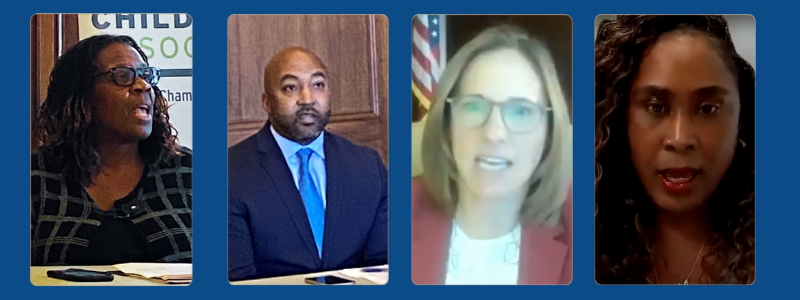WCA’s Expert Panel Discussion on Emerging Adults in Westchester’s Criminal Justice System Draws Crowd from Across the County and State
On October 19th WCA hosted a much-anticipated event when we pivoted from our focus on Raise the Age legislation (RTA) to a broader youth justice agenda. We are very thankful to the Westchester Women’s Bar Association Foundation, Inc. for sponsoring a panel of state and county legal and advocacy experts who came together during this free, hybrid event on emerging adults 18 to 25 years of age. While the data shows high rates of recidivism for this population, the research suggests they benefit the most from rehabilitative alternatives to incarceration. Building on the success of RTA, WCA is advocating for second chances for young people, helping them reach transitional milestones in education, employment, and personal and professional growth.
Over 85 guests joined us via zoom or in person at Manhattanville College following CDC guidelines. Our panel of experts included: (left to right)
- Edwina Mendelson, First Deputy Chief Administrative Judge and Head of NYS Office of Justice Initiatives
- Jared Rice, Judge, New Rochelle City Court and Founder of Opportunity Youth Part of City Court
- Miriam Rocah, Westchester County District Attorney
- Tamika Coverdale, Diversity, Equity, and Inclusion Officer/Senior Trial Counsel at The Legal Aid Society of Westchester County

As part of the overview, the audience learned trends in Westchester County parallel those seen on state and national levels where emerging adults account for roughly 10% of state and national populations but represent nearly 25% of arrests in NYS and 30% of arrests nationally. Furthermore, emerging adults in New York have historically high rates of recidivism where over 75% of emerging adults released were re-arrested within a 3-year span. As Judge Mendelsohn says, “overrepresentation is a soft word” for the stark racial disparities among emerging adults arrested in New York. Black and Latino adults 18 to 25 represent 16% and 22% of emerging adult populations respectively but made up 43% and 26% of young adults arrested in NYS in 2019.
There are several efforts across Westchester to provide rehabilitative, comprehensive support and services that address the root problems of education, poverty, and lack of social support particular to those involved with the justice system. The Opportunity Youth Part of the New Rochelle City Court and the Mount Vernon Emerging Adult Justice Court both aim to tailor court procedures to the needs of emerging adults on a case-by-case basis in partnership with service providers. There was a memorable one-liner from Judge Mendelson, “one size, fits one.”
Our panelists highlighted the need to remove barriers to success for emerging adults and focus on responses that will reduce justice-system involvement such as housing, employment, mental health and wellness, and life design and planning. Far-reaching community and program partnerships are essential to this work to create support networks many young adults lacked. Perhaps, Judge Rice said it best “your net worth is your network.” Increased use of restorative justice is also critical to help repair the damage caused by criminal activity through reconciliation between the offender, victims, and the broader community in pursuit of healing, mentorship, and life-changing opportunities that successfully rehabilitate individuals.
While Westchester has several innovative programs in place, WCA and our fellow advocates know more must be done to support justice-involved, emerging adults. Kate Rubin, Director of Policy and Strategic Initiatives at Youth Represent, provided an advocacy overview of NYS legislation that we and statewide partners are advancing called the “Youth Justice and Opportunities Act.” This bill is currently in the NYS Senate and Assembly and would create additional occasions for judges to sentence young people to rehabilitative treatment as an alternative to incarceration and provide additional means to reduce recidivism such as criminal record sealing which guards against social – and often lifelong – consequences and stigma for the offender.
There is a clear and growing local focus on supporting emerging adults in ways that have long-term effects and reduce the rate of contact with the criminal justice system. This was an initial conversation. Stay tuned as we begin this new chapter in WCA’s advocacy and channel the momentum from our panel to focus on prevention, data tracking and outcomes, and growing County partnerships. #WCAyouthjustice
Read other articles in our eBulletin #19
- Vote for Kids Candidate Survey
- Mental Health Roundtable for Children & Youth
- WCA’s new Guidestar gold seal rating!
#WCAeBulletin


